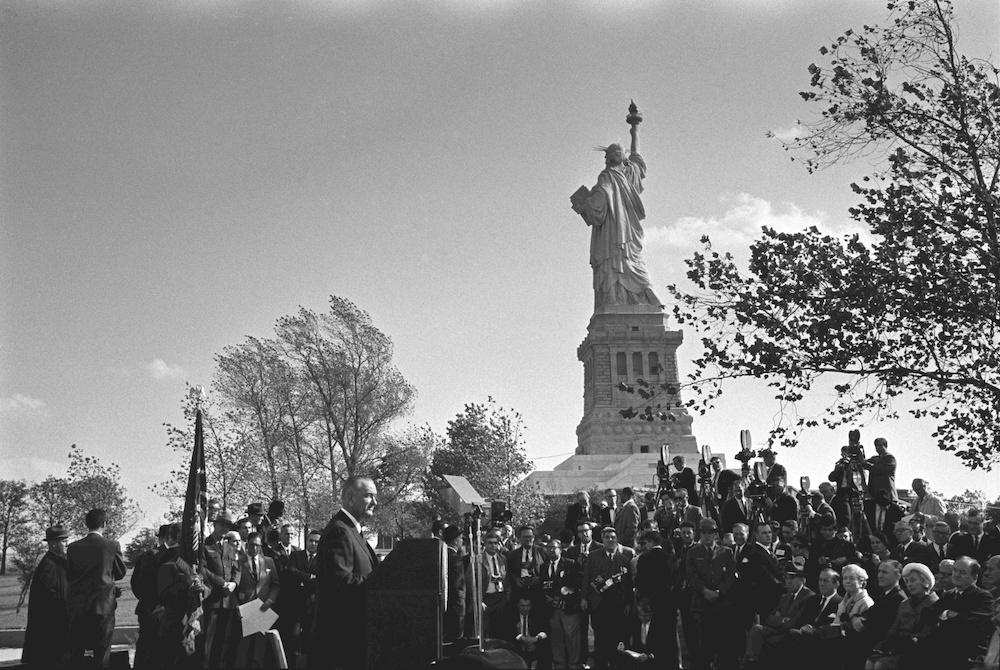How the civil rights movement opened the door to immigrants of color

President Lyndon Johnson delivered remarks at the Statue of Liberty before signing into law the Immigration and Nationality Act of 1965. Inspired by the civil rights movement, the law did away with racial quotas in the U.S. immigration system. (LBJ Library photo by Yoichi Okamoto.)
"The very country to which many of our people were taken as slaves during the transatlantic slave trade has now decided to ban refugees from some of our countries."
So said African Union head Nhosazana Dlamini-Zuma as she addressed the group's members during this week's summit in Ethiopia. Dlamini-Zuma was speaking about President Donald Trump's controversial executive order suspending the U.S. refugee program for at least 120 days and banning travel from seven majority Muslim countries — Iran, Iraq, Libya, Somalia, Sudan, Syria and Yemen — for at least 90 days.
As the United States once again grapples with contentious issues at the intersection of immigration and racial justice, her words underscored how the same white supremacy that's long troubled the nation's domestic affairs has also been expressed in its immigration policy.
A hundred years ago this month, for instance, Congress passed the Immigration Act of 1917, effectively banning Asian, Mexican and Mediterranean people from entering the United States, along with the poor, political radicals and those with mental or physical disabilities.
Seven years later, Congress passed the Immigration Act of 1924, also known as the Asian Exclusion Act. The law created a quota system that prioritized immigrants from Northern and Western Europe, drastically restricted immigrants from Southern and Eastern Europe and Africa, and completely banned Arabs, Asians and Indians. The law's stated purpose was to "preserve the idea of American homogeneity."
At the same time U.S. policy was restricting immigration by people of color, it was denying full citizenship rights to native-born people of African descent whose ancestors had been forced into bondage. It robbed them of their voting rights, deprived them of labor rights, and forced them into segregated facilities.
Then came the civil rights movement.
When four African-American college students from North Carolina's A&T University sat down at a segregated Woolworth's lunch counter in Greensboro 57 years ago this week, they ignited a movement that brought down Jim Crow and led to the passage of the Civil Rights Act of 1964 and Voting Rights Act of 1965.
But the movement did not end there: It also played a role in ending the race-based immigration quota system.
As the the civil rights movement gained momentum in the 1960s, it made the idea of America as a white nation increasingly unacceptable. Just a few months after passing the Voting Rights Act, Congress passed the Immigration and Nationality Act of 1965, abolishing the race-based immigration quota system and replacing it with a system that prioritized refugees, people with special skills, and those with family members living in the United States. It also forbade discrimination in the issuance of immigrant visas on the basis of race, sex, nationality, place of birth, or place of residence.
While the bill passed overwhelmingly, most of the "no" votes were from the South, where resistance to racial equality remained strong. President Johnson signed it into law while sitting beneath the Statue of Liberty.
"This [old] system violates the basic principle of American democracy, the principle that values and rewards each man on the basis of his merit as a man," Johnson said. "It has been un-American in the highest sense, because it has been untrue to the faith that brought thousands to these shores even before we were a country."
The law is now being cited in some of the many lawsuits that have been filed challenging Trump's executive order, including the one filed by the Council on American-Islamic Relations.
"This is not a Muslim ban simply. It is a Muslim exclusion order," Lena Masri, an attorney on the case, told Vice, citing its apparent intent of initiating the "mass expulsion of immigrant and nonimmigrant Muslims lawfully residing in the United States by denying them the ability to renew their lawful status or receive immigration benefits afforded to them under the Immigration and Nationality Act of 1965."
CAIR filed its suit in the Eastern District Court of Virginia. The group's officials said they chose that court because it's known for acting quickly.
Tags
Rebekah Barber
Rebekah is a research associate at the Institute for Southern Studies and writer for Facing South.
